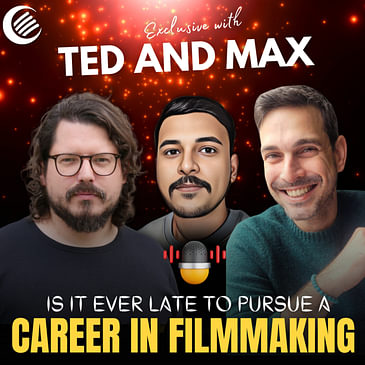Join us for an exclusive podcast episode where we dive deep into the world of Ted and Max, the dynamic director duo whose innovative vision and collaborative spirit have made a significant impact in filmmaking.
From their first steps to their latest triumph, "Thieves in the Night," get an insider's view of their artistic journey and the passion that drives their craft.
🎬 Special Segments:
- The Big Jump : Explore the pivotal moment that launched their careers in the world of cinema.
- Risk and Reward : A deep dive into the highs and lows of being artists in the competitive film industry.
- Birth of Director Duo : Discover how Ted and Max joined forces to create unforgettable cinematic experiences.
- Movie 'Thieves in the Night' : An inside look at their acclaimed project, from inception to execution.
- Grandma's Story Scene : A detailed discussion on crafting one of the film’s most memorable scenes.
- The Chaos Scene : Insights into the complexities of filming one of the movie's most intense sequences.
Episode Breakdown:
- 00:00 Coming Up: A sneak peek at the highlights of today's episode.
- 2:52 Introduction: Meet Ted and Max and get a glimpse of their remarkable career.
- 10:13 The Big Jump: Explore the pivotal moment that catapulted Ted and Max into the world of filmmaking.
- 19:01 Risk and Reward as an Artist: A deep dive into the challenges and triumphs faced by artists in the industry.
- 23:10 How I Made My First Film: Ted and Max share the journey and obstacles overcome while creating their debut film.
- 28:48 The Birth of Director Duo: Discover the origins of Ted and Max's successful collaboration as a directing duo.
- 34:28 Movie ‘Thieves in the Night’: An inside look at the making of the acclaimed film Thieves in the Night.
- 37:08 Process Shooting the Movie: Behind-the-scenes insights into the filming process of Thieves in the Night.
- 40:00 Idea of The Movie ‘Thieves in the Night’: Learn about the inspiration and conceptualization of the film.
- 41:40 Making of the Scene ‘Grandma's Story’: A detailed discussion on the creation of one of the most memorable scenes.
- 44:38 Shooting Time and Process: The logistics and experiences of shooting the film.
- 49:19 Characters and Their Relations: An exploration of the film's characters and their intricate relationships.
- 55:21 Shooting of ‘The Chaos Scene’: A look at the complexities of filming one of the movie's most chaotic scenes.
- 59:57 Important Communication with DOP: The vital role of communication with the Director of Photography in bringing a vision to life.
- 61:25 Building Core Team for RCC: The strategy behind assembling a reliable and creative core team for Ted and Max's production company, RCC.
- 63:52 Budget and Plan for a Film: Insights into the financial planning and budgeting necessary for successful filmmaking.
- 73:12 Rapid Fire with TED & MAX: A fun and fast-paced segment where Ted and Max answer rapid-fire questions from Ajay.
- 82:06 Advice for New Filmmakers: Closing the episode with invaluable advice and tips for aspiring filmmakers looking to make their mark in the industry.




